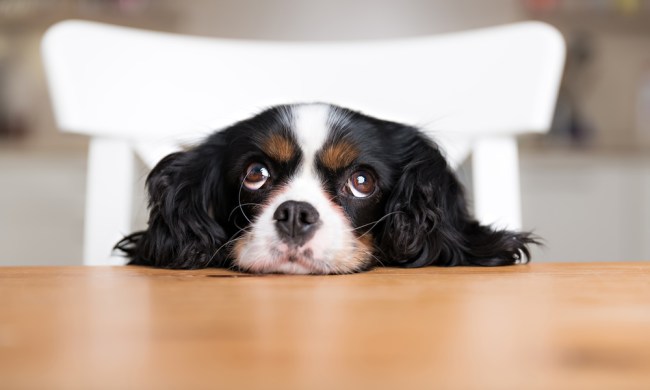
If you’ve ever been around a dog, you’ve likely been on the receiving end of a lick or two. Traditionally, people associate licks with kisses. However, if your dog is constantly slobbering all over you, you may wonder: Why does my dog lick me so much? Is something wrong?
Also, there’s a totally untrue rumor that dogs don’t love us but merely use us for food. That said, the idea that a dog’s licks are also a sign of affection is also something of a myth. Your dog may have other motives for treating you like their personal ice cream cone. Some are as sweet as your favorite frozen novelty, while one may leave a saltier taste in your pup’s mouth. Here are several reasons why your dog licks you, plus when to be concerned and how to curb the behavior if you want.
Why does my dog lick me so much?

Dogs lick their favorite humans for various reasons, including instincts and affection, and to flag feelings of physical or mental distress. Understanding what causes a dog to lick you so much can help you determine which one applies to your pet and get them help if necessary.
Instincts
Dogs used licking for various reasons before becoming the domesticated companion animals we know and love. Mother dogs lick to groom and comfort their new puppies and even encourage them to use the potty. Additionally, baby wolves, foxes, and coyotes will lick their mother when she returns from hunting to get her to throw up her food for them to eat (Gross? Yes. Natural and life-sustaining? Also, yes.)
While your dog is domesticated — and may be spayed and neutered — they may still have this innate desire to lick you to clean you off, comfort you, or perhaps get you to lose your lunch for their benefit (no need to oblige).
Affection
The rumors might be true — some dogs lick for a similar reason that you may kiss a loved one (four-legged or two-legged) — to show love. While dogs once licked for food and grooming purposes, the behavior has evolved, just like dogs themselves (and our relationship to them).
Some dogs may lick you to let you know they’re thrilled you’re home from your 30-minute-going-on-five-year adventure to the grocery store. Others may snuggle up to you and lick you a few times while you watch Netflix to bond. Soak up those puppy kisses, regardless of your furry friend’s age.
Comfort
Are you down in the dumps after a stressful day at the office? Don’t be surprised if your dog showers you with licks. Your pet may be a better reader of your state of mind than a mood ring. If your pup senses something is off, they may start licking you to display empathy. This instinct may be inherited since mother dogs lick their puppies to comfort them during their first weeks.
You’re delicious
Aside from the instinctual drive to get you to regurgitate your food, dogs may lick their humans because they taste good. For instance, some dogs are particularly keen on licking people who recently exercised. The salty taste of sweat may be one of their favorites.
While dogs have a legendary sense of smell far greater than a person’s (especially some breeds like beagles), they have fewer taste buds than we do. We have five times more taste buds than dogs. In other words, our sense of taste is stronger. That doesn’t mean dogs can’t taste, though, or enjoy the delicacy that is your post-workout sweat.
Attention
Dogs thrive on positive reinforcement. If you have habitually praised or snuggled them when they lick you, you encourage them to continue. Your dog may engage in a slobber fest if they want your attention and comfort, such as a belly rub (or treat).
On the flip side, excessive licking can be your dog’s way of letting you know they need attention for other reasons. Your dog may be sick, and chronic licking is also a red flag for stress. Is your dog showing other signs of illness, like lethargy or a dry nose? A vet trip may be in order. Did they undergo a significant life change, like a new baby or move? They may need some TLC and time to adjust.
When (and how) to do something about dog licking

Generally, dog licking is instinctual, habitual, or a sign of affection. However, if you suspect your dog is sick or stressed, call the vet. They can help you find solutions and treatments. Also, you may not enjoy constant tongue showers. In those cases, some ways to curb the behavior include:
- Redirecting the dog’s attention when they go in for a lick to a toy
- Purchasing lick pads
- Treating the dog for focusing on or licking something else or refraining from licking you
- Ensuring your dog is getting plenty of enrichment and comfort through toys, exercise, and physical touch as desired throughout the day
A trainer may also be able to help you with some of these strategies.
Closing thoughts

Dogs lick people for various reasons. While kissing is traditionally associated with licking — and affection is one reason — dogs may instinctually give you a tongue bath. Throughout time, dogs have licked their puppies for comfort and grooming, and small dogs lick adult ones that return from a hunt to get them to throw up food so they can eat.
Sometimes, dogs may lick because they are feeling sick or stressed. Generally, licking is natural and nothing to be concerned about. However, a vet or trainer can help you determine why your dog is licking and curb the behavior (or treat any applicable illness).



